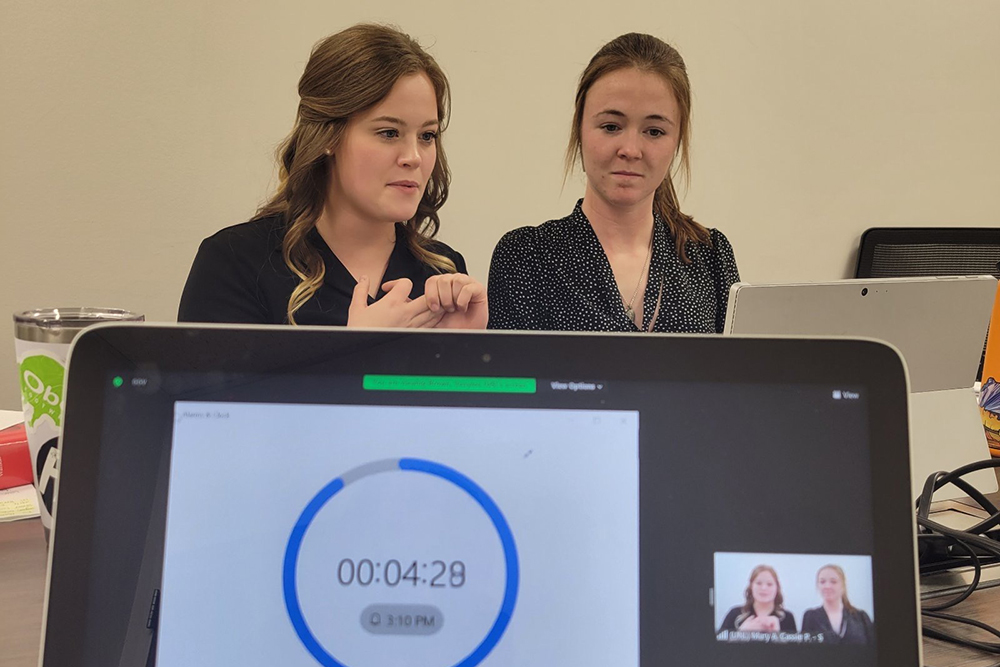Calendar Icon
Apr 26, 2022
Person Bust Icon
By Karl Vogel
![]() RSS
Submit a Story
RSS
Submit a Story

A team from the University of Nebraska-Lincoln College of Engineering reached the semifinals of the Lockheed Martin Ethics in Engineering Case Competition held virtually Feb. 28-March 1.
The Nebraska team was comprised of two students – Mary Ankenbauer, a senior mechanical engineering major, and Cassie Perry, a junior majoring in chemical engineering – and faculty advisor Mohamed Amar, Ph.D., lecturer in mechanical and materials engineering.
"The participants in Lockheed Martin competition included many of very high-caliber universitiesand schools ," Amar said. "It was an honor to participate, but it was also a very valuable experience for Mary and Cassie in getting real-world experience in a situation that presents engineering, business and ethical challenges."
Nebraska began the double-elimination competition by defeating Baylor University, then defeated 2021 champion Texas A&M in the second round. After a win against The Citadel in the third round, Nebraska lost against the Coast Guard Academy and then lost to the U.S. Military Academy, the two teams that wound up tying for the championship.
The competition brings together squads – a two-student undergraduate team and accompanying faculty - from colleges and universities across the U.S. to present their solutions to a fictional case involving ethical, business, and engineering dilemmas. Lockheed Martin's website says the purpose of the event is to "compel students to think about the importance of ethics in the workplace and the various real-life dilemmas that can arise, especially in the multifaceted and fast-paced world of technology."
Finding students willing to take on the requirements of the ethics competition preparations was not easy, Amar said, especially with the many hours of training required outside of their already rigorous engineering coursework, classes and, in some cases, research responsibilities.
One of the first students Amar contacted was Ankenbauer.
"I knew Mary because she had taken a class with me, and she knew Cassie. They're both very high-caliber students," Amar said.
Perry was recommended by Karen Stelling, professor of practice in mechanical and materials engineering, who teaches Engineering and Workplace Ethics (Engineering 400).
Ankenbauer and Perry said some of their interest in being on the team was how the competition's focus on ethics aligned well with their personal approaches to engineering.
"I liked learning about engineering case studies of how engineering disasters could have been prevented, especially in the decisions made beforehand," Ankenbauer said. "Ethics should be a big, big part of engineering, and I don't think enough young engineers think about it like that."
"It's the same thing with me, too," Perry said. "You can find someone in an engineering building who can do math all day, but when you find somebody who cares about other people and takes into account the community and other things that are impacted by their decisions, that's what makes a good engineer."
To prepare for the competition, the team met weekly, starting in the Fall semester. These sessions, Amar said, included debating mock ethics cases provided by Lockheed Martin and then working to develop a short pitch on the various aspects of the case. Ankenbauer and Perry would present their solutions during Friday sessions, and he would provide feedback.
"We'd go back and forth and debate every single thing until we found something we liked," Ankenbauer said. "Most of the time it came to us pretty simple, really fast, and then we'd spend hours forming facts around it."
"At first, it was just twice a week – we did that all Fall semester," Perry said. "As we got closer to competition, it ramped up a lot. We're spending weekends together and it brought us together as a team. We learned we can lean and rely on each other."
Amar said learning the parameters of criticism within a business team structure is something this competition teaches that is extremely valuable in a real-world engineering environment.
"It gave them the edge to be critical in a very difficult set of circumstances, to be able to make a decision, then compromise to the right solution when the other side is not willing. They were able to handle that," Amar said. "It helped them find a voice they'll need when they're in the room with other high-caliber engineers.
"I saw them develop from two virtual strangers to the way they work together now, almost seamlessly," Amar said.
The experience helped the students form a bond they could see lasting a long while. They've even brainstormed names for a possible professional venture.
"It's like we're taking ownership of our viewpoint in a way," Ankenbauer said.
"I've said I found a primary business partner if I ever start an engineering firm," Perry said. "I know the first person I'm going to."
Submit a Story